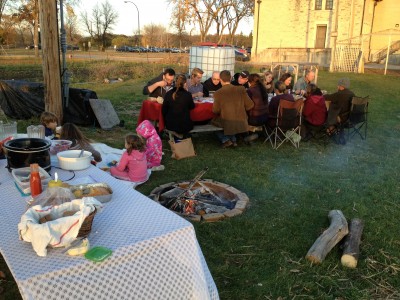By Carly Foubert, CFICE Volunteer
Sharing the Table Manitoba is a CFICE community partner whose relationship with CFICE developed within the Community Food Security hub. It is a network of individuals ranging from food producers such as fishermen and women and farmers, to food consumers, with the aim of creating a space for discussion and change around food policies.

Local citizens pick strawberries at a Sharing the Table Manitoba-affiliated farm in southeastern Manitoba. ©Sharing the Table Manitoba
Sharing the Table Manitoba emerged from a number of causes and for multiple reasons. Its existence can in part be contributed to the Real Manitoba Food Fight, which is an organization that works to develop alternative food systems in Manitoba. While both organizations share a great deal in common in their aims of creating alternative food systems, Sharing the Table Manitoba’s focus is shifted slightly to have a greater emphasis on food policies. In an interview with Colin Anderson, a Participatory Action Researcher at Sharing the Table Manitoba, he expressed the organization’s shift in focus away from food policy in urban and northern Manitoba towards rural Manitoba as an effort to fill the gap in rural food policy and establish a space for conversations between farmers, chefs, and citizens.
Colin attributes the raid of the Cavers farm as the catalyst that sparked events for mobilizing the food movement in Manitoba, and, ultimately, the start-up of Sharing the Table Manitoba. “During that raid I was there with a few students as part of a course called Live in Rural Communities and Environments. And we videotaped the confrontation between the food safety inspectors and the Cavers and made a video out of it. And it really created an opportunity and highlighted a lot of the problems around police and regulations in the province. So it brought people together in a highly politicized moment to really start to articulate what those problems are and to push back and try to open up the political opportunity to create change around those issues in the province.”
Jeanette Sivilay, a farmer, community organizer, and coordinator with Sharing the Table Manitoba added that the raid led many farmers to feel tentative about speaking out against food policies, which is where Sharing the Table Manitoba comes in. ”We hope that this can be considered a kind of safe space or that if all of a sudden punitive action were to be taken against these small farmers, that we would have this network that would mobilize quite quickly to provide resources, come to their defense, and bear witness to this situation in such a way that small farmers feel that they have allies.”

Jeanette Sivilay, a farmer, community organizer, and coordinator with Sharing the Table Manitoba. ©Jeanette Sivilay
This advocacy role is part of Sharing the Table Manitoba’s mission statement and its function within the community. The mission statement also includes educating the public, conducting research and analysis, and working to change policies and regulations.
Sharing the Table Manitoba partnered with CFICE after Colin’s involvement with the Canadian Association for Food Studies where he was able to foster connections with people in CFICE. Colin and Charles Levkoe, the Academic Co-lead for the Community Food Security hub at CFICE, have been familiar with each other’s work for quite some time and as Colin describes it, CFICE was a good fit for Sharing the Table Manitoba.
Both Jeanette and Colin describe the work CFICE has done for Sharing the Table Manitoba as being really valuable for the network.
“The conferences that CFICE supported me going to, has helped us really start to connect with farmers outside of the province to realize that there are examples of where there are especially young and new farmers that are coming together to talk about the more political aspects of our food system, which has been really encouraging and exciting and has brought energy to what we’re trying to do in Manitoba,” said Jeanette.

Sharing the Table Manitoba members discuss pressing food security issues at a meeting. ©Sharing the Table Manitoba
CFICE’s involvement has allowed Sharing the Table Manitoba to refocus attention and contribute to the change that the organization is seeing to date, which has included work on a report that explores the role of government regulations, policies and programs in shaping the development of local sustainable food systems in the Province of Manitoba.
This work, along with providing platforms for discussion and getting the conversation started, has built confidence among community members that may be hesitant to speak up in fear of backlash from government officials and regulators. The government has also initiated a roundtable for discussion in response to food sovereignty organizations calling for change.
“I also think it has created an opportunity that would be far less developed if we hadn’t had the support of CFICE,” Colin said.
From a community perspective community-campus engagement projects like CFICE’s have a lot of potential. As Jeanette explained, “I think that any time we can get academics out of the university and into the community and really listening well to community members and focusing on what the community needs are, I think that’s important. I think that’s really where the relevance and importance of universities come in.”
Sharing the Table Manitoba welcomes individuals to join and be part of the movement. You can access information about their organization via their social media and their website.

